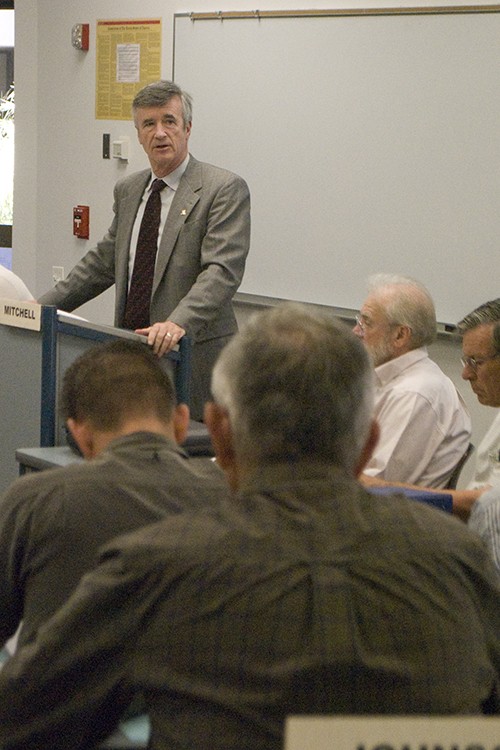UA President Robert Shelton addressed effects of the rebate students will receive next year and the lack of faculty and student involvement in the search for a vice president of medical affairs at the Faculty Senate meeting on Monday.
Shelton said that his budget plan before the Arizona Board of Regents meeting included a $78 million budget cut in fiscal year 2012, which would be covered by a reduction in operating expenses and tuition increases, and the use of reserve funds.
The regents approved a tuition increase with the amendment that each resident undergraduate student will receive a $750 rebate.
Shelton explained that because of the rebate, the university has to “”find”” about $11 million. He said that although this would be challenging, he is a “”very cautious budget person.””
Shelton added that some students may see the rebate as a “”victory,”” however, the UA may not be able to offer all the classes that it had planned to because of the rebate.
Sen. Marlys Witte, a surgery professor, said the search for a new vice president of medical affairs was conducted without any announcement or help from the elected faculty or students, which was the third time this has happened in the UA Medical School. She added that this was a violation of the Shared Governance Memorandum of Understanding and that faculty should provide a positive academic vision on the board.
She said that this was the only way for the board to go “”anywhere other then down.””
When Witte asked Shelton if he could assure the senate that the next vice president of medical affairs search would involve the faculty in congruence with the memorandum, he answered yes.
Shelton explained that the regents felt that having a diverse group from the community serve on the board could bring a “”vital community perspective to the whole process.”” Now, he said, the board of about 26 people seems “”much too large,”” and its size will need to be looked at. Shelton added that background qualifications would be established to see who qualifies to serve on the board.
“”Regents have the final say as to who goes on that board,”” he said.
The Faculty Senate also passed an undergraduate council consent agenda item to allow a Bachelor’s Degree in General Studies, which is an alternate to the UA’s Bachelor of Arts and Bachelor of Science degrees. The degree aims to provide students with a liberal arts and sciences education, and is aimed to target freshmen who enter the UA without a major or pre-major, transfer students entering without a major, students who began as pre-majors but were unable to gain admission and students who have not declared a major but are close to declaring, or have more than the 60 units to declare a major policy.
The idea for this degree arose when faculty members saw that certain interdisciplinary studies students were having trouble connecting their three-track degree.
The senate also discussed supporting assistant professors to reach tenure and continuing status.
Some senators, like Wanda Howell, a nutritional sciences professor and chair of the Faculty Senate, said they felt assistant professors should not be “”waiting for someone to tap them on the shoulder”” to give them a promotion.
Others, like Laura McCammon, a theatre, film and television professor, said that she has colleagues who have gone through the process and had such a bad experience that they did not want to go through it again.
The majority of the senate agreed that college department heads should be encouraging professors, specifically assistant professors, to increase research and grants in order to become promoted.









